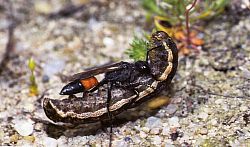Social Plasticity
The origin of sociality, involving a reproductive division of labour between the members of a society, represents one of the major evolutionary transitions. The key testing ground for theories concerning the origin of helping have been primitively eusocial taxa that lack morphological castes. Social phenotype varies within these species, correlated with factors such as latitude and altitude. Recently, by transplanting the sweat bee Halictus rubicundus between field sites, we directly induced transitions between sociality and non-sociality. The implication is that transitions may often represent condition-sensitive plasticity, or selection at just a few key developmental switch loci, rather than repeated evolutionary gains and losses of large suites of traits. These bees should make excellent models for understanding genomic changes involved in the origin of sociality.
Group formation
Our recent work provides an explanation for the surprising presence of unrelated helpers in a classic social insect model, the primitively eusocial wasp Polistes. Our current work on this system focuses on the process by which groups of co-foundresses form in the first place, including the role of biological markets.
Subfertility
Theories about how eusociality evolved are often tested by comparing the fitness of helpers with the fitness of individuals that reproduce independently. This approach assumes that all individuals are equivalent. However, one important candidate explanation for the evolution of eusociality is that helpers are physiologically constrained, such that helping is their only realistic option. By experimentally manipulating helper phenotype in sweat bees, we are directly testing this ‘subfertility’ hypothesis.
The evolution of parental care strategies
Invertebrate parental care strategies are incredibly diverse, ranging from simple egg-guarding  to the most complex societies. We are using experimental and phylogenetically-controlled comparative approaches to investigate the evolution of parental care strategies in apoid wasps. For example, we are interested in the evolution and ecology of progressive provisioning, which is often regarded as a preadaptation for the evolution of sociality. In progressively provisioning wasps, as in many vertebrates, offspring are given food only gradually as required, instead of receiving a single large mass of food at the time of oviposition (the ancestral condition).
to the most complex societies. We are using experimental and phylogenetically-controlled comparative approaches to investigate the evolution of parental care strategies in apoid wasps. For example, we are interested in the evolution and ecology of progressive provisioning, which is often regarded as a preadaptation for the evolution of sociality. In progressively provisioning wasps, as in many vertebrates, offspring are given food only gradually as required, instead of receiving a single large mass of food at the time of oviposition (the ancestral condition).


